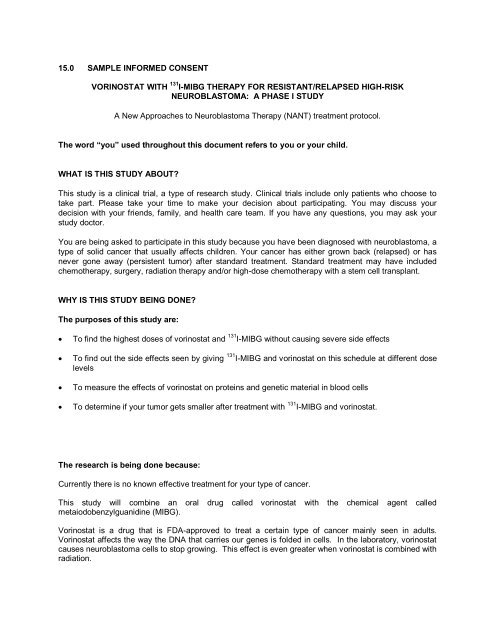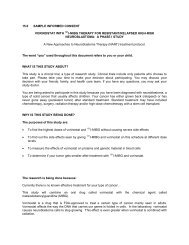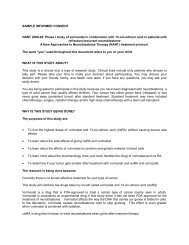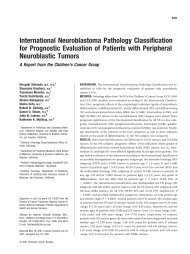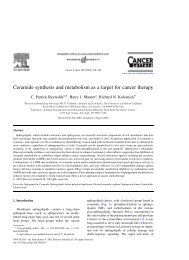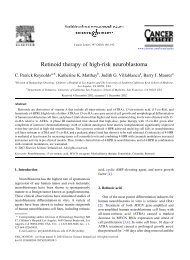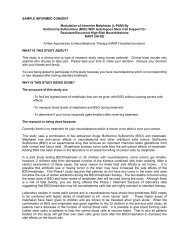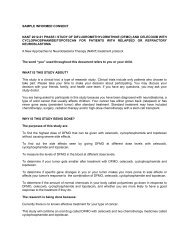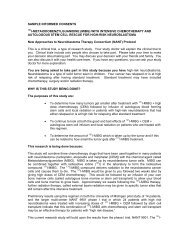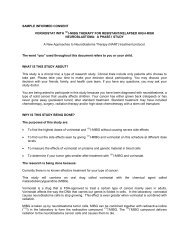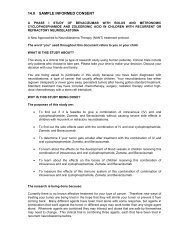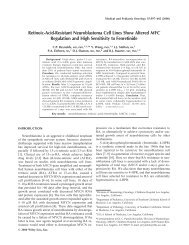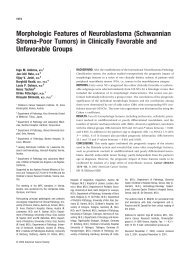Download a sample consent form for this study - NANT
Download a sample consent form for this study - NANT
Download a sample consent form for this study - NANT
Create successful ePaper yourself
Turn your PDF publications into a flip-book with our unique Google optimized e-Paper software.
15.0 SAMPLE INFORMED CONSENT<br />
VORINOSTAT WITH 131 I-MIBG THERAPY FOR RESISTANT/RELAPSED HIGH-RISK<br />
NEUROBLASTOMA: A PHASE I STUDY<br />
A New Approaches to Neuroblastoma Therapy (<strong>NANT</strong>) treatment protocol.<br />
The word “you” used throughout <strong>this</strong> document refers to you or your child.<br />
WHAT IS THIS STUDY ABOUT?<br />
This <strong>study</strong> is a clinical trial, a type of research <strong>study</strong>. Clinical trials include only patients who choose to<br />
take part. Please take your time to make your decision about participating. You may discuss your<br />
decision with your friends, family, and health care team. If you have any questions, you may ask your<br />
<strong>study</strong> doctor.<br />
You are being asked to participate in <strong>this</strong> <strong>study</strong> because you have been diagnosed with neuroblastoma, a<br />
type of solid cancer that usually affects children. Your cancer has either grown back (relapsed) or has<br />
never gone away (persistent tumor) after standard treatment. Standard treatment may have included<br />
chemotherapy, surgery, radiation therapy and/or high-dose chemotherapy with a stem cell transplant.<br />
WHY IS THIS STUDY BEING DONE?<br />
The purposes of <strong>this</strong> <strong>study</strong> are:<br />
<br />
<br />
<br />
<br />
To find the highest doses of vorinostat and 131 I-MIBG without causing severe side effects<br />
To find out the side effects seen by giving 131 I-MIBG and vorinostat on <strong>this</strong> schedule at different dose<br />
levels<br />
To measure the effects of vorinostat on proteins and genetic material in blood cells<br />
To determine if your tumor gets smaller after treatment with 131 I-MIBG and vorinostat.<br />
The research is being done because:<br />
Currently there is no known effective treatment <strong>for</strong> your type of cancer.<br />
This <strong>study</strong> will combine an oral drug called vorinostat with the chemical agent called<br />
metaiodobenzylguanidine (MIBG).<br />
Vorinostat is a drug that is FDA-approved to treat a certain type of cancer mainly seen in adults.<br />
Vorinostat affects the way the DNA that carries our genes is folded in cells. In the laboratory, vorinostat<br />
causes neuroblastoma cells to stop growing. This effect is even greater when vorinostat is combined with<br />
radiation.
MIBG is taken up by neuroblastoma tumor cells. MIBG can be combined together with radioactive iodine<br />
( 131 I) in the laboratory to <strong><strong>for</strong>m</strong> the radioactive compound 131 I - MIBG. The 131 I - MIBG compound delivers<br />
radiation to the neuroblastoma cancer cells and causes them to die.<br />
Giving vorinostat together with the 131 I-MIBG may help the 131 I-MIBG to kill more neuroblastoma cells.<br />
131 I-MIBG lowers the number of blood <strong><strong>for</strong>m</strong>ing cells (called stem cells) in the bone marrow when it is given<br />
at higher doses. Since the combination of vorinostat and 131 I-MIBG is expected to increase <strong>this</strong> effect, all<br />
patients will get back their own stem cells to help the bone marrow recover from <strong>this</strong> therapy.<br />
This <strong>study</strong> will be the first <strong>study</strong> to test giving vorinostat together with 131 I-MIBG and will help determine<br />
the highest doses of vorinostat and 131 I-MIBG that can safely be given together to patients with<br />
resistant/relapsed neuroblastoma.<br />
HOW MANY PEOPLE WILL TAKE PART IN THIS STUDY?<br />
Between 9 and 42 people will take part in <strong>this</strong> <strong>study</strong>.<br />
WHAT WILL HAPPEN TO ME IF I TAKE PART IN THIS STUDY?<br />
Medical Tests Be<strong>for</strong>e You Begin the Study<br />
You will need to have the following exams, tests or procedures to find out if you can be in the main part of<br />
the <strong>study</strong>. These exams, tests or procedures are part of regular cancer care and may be done even if you<br />
do not join the <strong>study</strong>. These tests will also be done at various times throughout the <strong>study</strong> and at the end<br />
of the <strong>study</strong>. The purpose of these tests is to see how well the treatment works and to measure the status<br />
of your neuroblastoma. If you have had some of them recently, they may not need to be repeated. This<br />
will be up to your <strong>study</strong> doctor.<br />
Physical exam Bone marrow tests #<br />
Blood tests<br />
Various scans*<br />
Pregnancy test<br />
Echocardiogram and EKG to check the heart function<br />
Urine tests<br />
Test of kidney function<br />
# Bone marrow tests are done by inserting a needle into the hip bone to remove the marrow which is<br />
inside the bone.<br />
* Various scans that are done <strong>for</strong> diagnosis and checking the response of the tumor to treatment. These<br />
may include CT and /or MRI scans and MIBG scans. We will recommend scans specific <strong>for</strong> your case and<br />
we will answer your questions about these scans.<br />
During the Study<br />
If the exams, tests and procedures show that you can be in the <strong>study</strong>, and you choose to take part, then<br />
you will need the following tests and procedures during the <strong>study</strong>. They are part of regular cancer care.<br />
Physical exam<br />
Blood tests and scans<br />
Pregnancy test<br />
Urine tests<br />
Bone marrow tests<br />
Various tests<br />
Echocardiogram and EKG to check the heart function<br />
Test of kidney function
Treatment Plan<br />
Be<strong>for</strong>e you can get treatment on <strong>this</strong> <strong>study</strong>, stem cells must be available that meet the <strong>study</strong> requirements<br />
A map of one treatment course is shown here.<br />
Therapy V V V+M V HSC Eval<br />
Days 1 2 3 4-14 17 56<br />
V = Vorinostat<br />
M = 131 I-MIBG<br />
HSC = Stem cell infusion<br />
Eval = Repeat disease evaluation<br />
Vorinostat V Days 1-14<br />
131 I-MIBG M Day 3<br />
Stem Cells HSC Given on Day 17<br />
GCSF GCSF Given after stem cells until white blood count recovers<br />
Evaluation Eval Evaluations after finishing treatment on Day 56<br />
You will receive vorinostat by mouth once a day with food in the morning on Days 1-14. Vorinostat will be<br />
given as a liquid.<br />
You will receive 131 I-MIBG in the hospital on Day 3 (see below: Treatment with MIBG).<br />
You will receive your stem cells back on Day 17 and start GCSF (Neupogen or filgrastim) until your white<br />
blood cells recover.<br />
If you have a serious infection, vorinostat may be stopped early, your stem cells may be given early, and<br />
you may start GCSF early.<br />
You will be assigned a certain vorinostat dose and a certain 131 I-MIBG dose. This <strong>study</strong> will test up to 4<br />
vorinostat doses and up to four 131 I-MIBG doses in groups of 3-6 patients. The starting vorinostat dose <strong>for</strong><br />
the first group of patients is about 20% lower than what is currently being given to patients receiving<br />
vorinostat alone without bad side effects. The dose of 131 I-MIBG will then be increased in the second<br />
group of patients. If <strong>this</strong> is tolerated without serious side effects, then the vorinostat and 131 I-MIBG doses<br />
will be increased (“dose escalation”) in groups of 3-6 patients until serious side effects are seen. At that<br />
point, investigators will have found the highest dose of vorinostat and 131 I-MIBG that can be given<br />
together without bad side effects.<br />
An additional six patients will be treated at the highest dose of vorinostat and 131 I-MIBG to learn more<br />
about the side effects and the response of the tumor with those doses.<br />
You can receive <strong>this</strong> combination of vorinostat and 131 I-MIBG up to two times as part of <strong>this</strong> <strong>study</strong>, as long<br />
as:<br />
--your tumor is not getting worse;<br />
--you have enough stem cells to get a second course; and<br />
--you have not had any bad side effects from the first course.
Treatment with 131 I-MIBG<br />
Treatment with 131 I-MIBG will be done at a hospital that is set up to take care of patients that are treated<br />
with radioactive substances. This means that you may need to travel some distance to another hospital to<br />
get <strong>this</strong> treatment. Your doctor will talk with you about where the different hospitals are that can give the<br />
131 I-MIBG treatment. Your nurse and other members of the team that take care of you can help you plan<br />
<strong>for</strong> the trip to get <strong>this</strong> treatment.<br />
Patients will be admitted to a 131 I-MIBG treatment center on day 2 of therapy. On the following day (Day<br />
3), 131 I-MIBG is given into a temporary IV or in your central venous catheter over 90-120 minutes. IV<br />
fluids <strong>for</strong> hydration and other medicines will be given through your central venous catheter.<br />
Patients who get 131 I-MIBG are considered to be “hot” or radioactive and special precautions are taken to<br />
care <strong>for</strong> you during <strong>this</strong> time until the radiation level has gone down to a level where these precautions<br />
are no longer needed (usually 4 - 5 days). Special care precautions include:<br />
<br />
<br />
<br />
<br />
A single room in a bed surrounded by a lead shield to keep family and the staff who take care of you<br />
from being exposed to radiation from the 131 I-MIBG treatment. This usually takes about 5 days.<br />
The length of time family can visit inside the room in front of the protective lead shield that is around<br />
your bed will depend on how much radiation is measured in the room each day by the radiation<br />
specialist. Usually family can visit <strong>for</strong> a total of 30-45 minutes on the first day and longer on the days<br />
after that because there will be less radiation measured in the room each day.<br />
Family may visit anytime outside of the room behind a lead shield. You will be able to see who is<br />
visiting over <strong>this</strong> shield.<br />
No one will be able to spend the night in <strong>this</strong> special room with you during <strong>this</strong> time.<br />
Your urine will be radioactive after treatment with 131 I-MIBG. A urinary catheter will be inserted through<br />
your urethra into the bladder to drain the radioactive urine from your body. This catheter will be removed<br />
3 –5 days following the treatment.<br />
You will also take a medicine by mouth, (potassium iodide) to prevent thyroid damage from the<br />
radioactive iodine contained in the 131 I-MIBG compound. The medicine will be taken by mouth beginning<br />
be<strong>for</strong>e the treatment and continuing <strong>for</strong> a total of 6 weeks.<br />
When you have finished treatment with vorinostat and 131 I-MIBG<br />
After you stop treatment with 131 I-MIBG and vorinostat, you will continue to have tests and scans done<br />
(listed below) to measure how much tumor is left. If test results show you have abnormal organ functions,<br />
tests will be repeated monthly until test results are stable or normal. You doctor will tell you how often<br />
these tests and evaluations will be done.<br />
Medical Tests after the Study:<br />
Physical exam Bone marrow tests #<br />
Blood tests<br />
Various scans*<br />
Urine tests<br />
A table detailing the tests and procedures required be<strong>for</strong>e, during and after the <strong>study</strong> has been attached to<br />
the end of <strong>this</strong> <strong>consent</strong>.<br />
Optional Tests in <strong>this</strong> Study
You will be asked if you want to participate in tests that are being done to see how the <strong>study</strong> drugs are<br />
affecting your body. This part of the <strong>study</strong> is voluntary and is only done in the first course of<br />
treatment. The results of these tests would not be told to you or your doctor or become part of your<br />
medical record. These results would also not be used to make decisions about your care while enrolled<br />
on <strong>this</strong> <strong>study</strong>. You can decide not to let the doctors do these tests and still be able to be treated with<br />
vorinostat and 131 I-MIBG as part of <strong>this</strong> clinical <strong>study</strong>. There are checkboxes on the next to last page of<br />
<strong>this</strong> <strong>consent</strong> <strong><strong>for</strong>m</strong> to mark whether you are willing to participate in these voluntary studies.<br />
<br />
Determining Vorinostat’s Effect on Proteins and Genes in Blood Cells<br />
Part of the research goal <strong>for</strong> <strong>this</strong> <strong>study</strong> is to look at changes in certain proteins and genes in the blood<br />
cells be<strong>for</strong>e and after you have been treated with vorinostat. For <strong>this</strong> test, 10 mL of blood (about 2<br />
teaspoons) will be taken 4 times to measure certain proteins and genes in the blood cells. This testing will<br />
be done over the first 14 days of the treatment with vorinostat. You will not need separate clinic visits to<br />
participate in <strong>this</strong> part of the <strong>study</strong>. The total amount of blood drawn <strong>for</strong> testing will be 40 mL (about 8<br />
teaspoons) over 14 days. The blood will be drawn or taken from your central line (or port). This amount<br />
of blood is considered safe to donate. Samples will be sent to the University of Cali<strong>for</strong>nia in San<br />
Francisco, CA <strong>for</strong> analysis.<br />
HOW LONG WILL I BE ON THIS STUDY?<br />
You will receive up to two courses of treatment on <strong>this</strong> <strong>study</strong>.<br />
After you stop treatment, you will continue to have tests and scans done to measure how much tumor is<br />
left. Your doctor will tell you how often these tests will be done. Researchers will continue to collect<br />
in<strong><strong>for</strong>m</strong>ation about you <strong>for</strong> a lifetime. In<strong><strong>for</strong>m</strong>ation will be collected about whether you are still alive; whether<br />
your tumor has grown back and at what sites in the body; whether you have developed any side effects<br />
from the treatment; or whether you have developed any additional cancer. Your oncologist or family doctor<br />
will give the researchers <strong>this</strong> in<strong><strong>for</strong>m</strong>ation at regular intervals.<br />
CAN I STOP BEING IN THE STUDY?<br />
Yes. If you are thinking about stopping the <strong>study</strong>, you should talk to your doctor be<strong>for</strong>e making a final<br />
decision so he/she can tell you how to do <strong>this</strong> safely. There are certain time points in the <strong>study</strong> where it<br />
would be strongly recommended that you complete the medical supportive care required to avoid very<br />
bad and/or fatal side effects.<br />
<br />
<br />
Once you have gotten 131 I-MIBG treatment, you will stay in the special room until you are no longer<br />
radioactive (usually 5 days), since you could expose others to radiation.<br />
Once you have gotten 131 I-MIBG treatment, it would be strongly recommended that you complete the<br />
medical supportive care needed to avoid very bad and/or fatal side effects.<br />
The <strong>study</strong> doctor may stop you from taking part in <strong>this</strong> <strong>study</strong> at any time if he/she believes it is in your<br />
best interest; if you do not follow <strong>study</strong> rules; or if the <strong>study</strong> is stopped.<br />
WHAT ARE THE RISKS OF THE STUDY?<br />
This is a Phase I <strong>study</strong>. A Phase I <strong>study</strong> looks at how common and serious side effects can be <strong>for</strong> each<br />
patient at a specific dose of a drug. In a Phase I <strong>study</strong>, some patients may have very serious side effects<br />
and could die as a result of these side effects. You may be one of those patients who has serious side<br />
effects as a result of participating in <strong>this</strong> Phase I <strong>study</strong>.
In <strong>this</strong> <strong>study</strong>, researchers will be looking at side effects seen in patients taking different doses of<br />
vorinostat and 131 I-MIBG. Since subjects will be assigned to different doses of vorinostat and 131 I-MIBG,<br />
some subjects may receive doses that are too small to be effective while others may receive higher doses<br />
that may cause increased side effects.<br />
Everyone taking part in the <strong>study</strong> will be watched carefully <strong>for</strong> any side effects. However, doctors don’t<br />
know all the side effects that may happen. Side effects may be mild or very serious. Other drugs may be<br />
given to make side effects less serious and more com<strong>for</strong>table (such as <strong>for</strong> nausea, headache or itching).<br />
Many side effects go away soon after you stop taking vorinostat and 131 I - MIBG, but it is always possible<br />
that side effects can be serious, long lasting or may never go away. There is also a risk of death. Patients<br />
are watched carefully and treatment will be stopped if bad side effects develop. Because <strong>this</strong> combination<br />
has never been given to children be<strong>for</strong>e, there may be risks we do not know about. You should talk to<br />
your doctor about any side effects that you have while taking part in <strong>this</strong> <strong>study</strong>. While on the <strong>study</strong>, you<br />
are at risk <strong>for</strong> the side effects listed on the following pages.<br />
Possible side effects of Vorinostat<br />
Likely (happens to 21-100<br />
children out of every 100<br />
children)<br />
Less Likely<br />
(happens to 5-20 children out<br />
every 100 children)<br />
Rare<br />
(happens to < 5 children out<br />
every 100 children)<br />
<br />
<br />
<br />
<br />
<br />
<br />
Low blood counts, including<br />
low red blood cells (which<br />
can cause fatigue or pale<br />
appearance) and platelets<br />
(which can cause bruising or<br />
bleeding).<br />
Fatigue<br />
Poor appetite<br />
Diarrhea<br />
Nausea<br />
Vomiting<br />
<br />
<br />
<br />
<br />
<br />
<br />
<br />
<br />
<br />
<br />
<br />
<br />
<br />
<br />
<br />
<br />
<br />
<br />
<br />
<br />
Decrease in specific types of<br />
blood cells (white blood cells<br />
which can cause increased<br />
risk of infection)<br />
Weight Loss<br />
Decreased kidney function<br />
High blood sugar<br />
Fever<br />
Hair loss<br />
Constipation<br />
Dehydration<br />
Dry mouth<br />
Heartburn<br />
Taste changes<br />
Infection<br />
Low protein in the blood<br />
Changes in liver blood<br />
tests<br />
Changes in blood salts<br />
Muscle spasm or<br />
weakness<br />
Dizziness<br />
Abdominal pain<br />
Cough<br />
Shortness of breath<br />
<br />
<br />
Skin breakdown<br />
Changes in a specific<br />
part of the heart tracing<br />
known as an EKG.<br />
(Mild changes in a<br />
specific part of the heart<br />
tracing known as an EKG<br />
has been rarely reported in<br />
patients treated with<br />
vorinostat, though it is not<br />
clear whether vorinostat<br />
caused these changes or<br />
not.)
Possible side effects of 131 I-MIBG<br />
Likely<br />
(happens to 21-100 children out<br />
every 100 children)<br />
Decrease in the number of red<br />
and white blood cells and<br />
platelets made in the bone<br />
marrow. You will need blood<br />
and platelet transfusions and<br />
sometimes stem cell infusions<br />
are necessary. The dose of<br />
131 I-MIBG used in <strong>this</strong> <strong>study</strong> will<br />
lower your blood counts.<br />
Nausea<br />
Dry mouth<br />
Increase in blood marker of<br />
salivary gland irritation<br />
Less Likely<br />
(happens to 5-20 children out<br />
every 100 children)<br />
Decreased function of the<br />
thyroid gland. This causes<br />
tiredness (fatigue), weight<br />
gain, constipation, and<br />
lower blood pressure.<br />
Treatment <strong>for</strong> life with a<br />
medicine to supplement<br />
the thyroid gland (i.e.<br />
Synthroid or related thyroid<br />
supplement) may be<br />
needed.<br />
Not being able to get<br />
pregnant or father a child<br />
High or low blood<br />
pressure during the 131 I-<br />
MIBG infusion<br />
Rare<br />
(happens to < 5 children out every 100<br />
children)<br />
Pain in salivary glands or mouth<br />
Decreased function of adrenal<br />
gland. This affects your activity level<br />
and growth. It causes tiredness<br />
(fatigue), weight changes and blood<br />
pressure changes. You may need<br />
to take medicine to supplement the<br />
adrenal gland.<br />
Decreased heart function<br />
Irritation of the liver. Because some<br />
of the radioactive 131 I - MIBG is taken<br />
up by the liver, there is a possible<br />
risk of future liver damage from the<br />
131 I - MIBG alone.<br />
Second cancer (such as leukemia)<br />
that is different from the kind of
Thinning of the hair<br />
Vomiting<br />
Infection due to low white<br />
blood cells<br />
Fatigue due to low red<br />
blood cells<br />
Bleeding/bruising due to<br />
low platelets<br />
Loss of appetite<br />
cancer you have now<br />
Trouble breathing due to infection or<br />
damage to the lung<br />
Overactive thyroid gland<br />
Possible risks from having a bladder catheter placed<br />
In order to safely receive MIBG therapy, you will need to a have a tube or catheter called a Foley catheter<br />
temporarily placed in your bladder. The catheter may cause you some discom<strong>for</strong>t and may increase your<br />
risk <strong>for</strong> getting a bladder infection.<br />
Possible side effects of Potassium Iodide:<br />
This medication is given <strong>for</strong> 45 days after the 131 I - MIBG infusion, to protect your thyroid gland.<br />
Likely<br />
(happens to 21-100 children<br />
out every 100 children)<br />
Less Likely<br />
(happens to 5-20 children out<br />
every 100 children)<br />
Rare<br />
(happens to < 5 children out every 100<br />
children)
Gastrointestinal distress<br />
(nausea / vomiting / diarrhea /<br />
stomach pain)<br />
Tingling, pain or weakness in arms<br />
and legs<br />
Flare up of acne in teenagers<br />
Irregular heartbeat<br />
Confusion<br />
Tiredness<br />
Fever<br />
Allergic reaction (hives)<br />
Burning of mouth / throat<br />
Metallic taste<br />
Rash<br />
Decreased function of the thyroid<br />
gland with overuse<br />
Swelling of lymph glands<br />
Possible side effects of G-CSF (Neupogen)<br />
G-CSF is not an anti-cancer medicine. It helps the growth of white blood cells that fight infection.<br />
Likely<br />
(happens to 21-100 children out<br />
every 100 children)<br />
Bone pain<br />
Less Likely<br />
(happens to 5-20 children out<br />
every 100 children)<br />
Pain or irritation at injection<br />
site<br />
Increased blood tests <strong>for</strong><br />
alkaline phosphatase, LDH<br />
and uric acid<br />
Low platelet count<br />
Fever<br />
Rare<br />
(happens to < 5 children out every 100<br />
children)<br />
Allergic reactions (more common with<br />
giving the drug IV than as an injection<br />
under the skin)<br />
Skin rash, itching, puffiness in the face<br />
Shortness of breath or wheezing<br />
Low blood pressure, fast heart rate<br />
Low grade fever<br />
Enlargement of the spleen.<br />
Rupture of the spleen<br />
Worsening of existing skin rashes<br />
Sickle cell crises in patients with sickle<br />
cell disease<br />
High white blood cell count in the blood<br />
Irritation / inflammation of veins in the<br />
skin<br />
Adult respiratory distress syndrome<br />
Bone marrow dysfunction (MDS) or<br />
secondary leukemia in patients with<br />
very bad ongoing neutropenia (not as<br />
seen in cancer patients) and long term<br />
administration.<br />
Possible side effects associated with stem cells
ANY TIME BEFORE STEM CELL INFUSION: The freezer where PBSC are stored could<br />
malfunction, the container holding them could break and the stem cells could be damaged so<br />
they could not be used. This is expected to be an extremely rare event. However, if <strong>this</strong> occurs,<br />
another stem cell collection may be attempted or the back-up stem cells (if available) may be<br />
used if they were not damaged.<br />
<br />
If stem cells needed to be shipped from one location to another, they could be lost or damaged<br />
during shipping such that they could not be used. This is expected to be an extremely rare event.<br />
If <strong>this</strong> occurs, another stem cell collection may be attempted or the back-up stem cells, if<br />
available, may be used.<br />
PURGED STEM CELLS ONLY: Purged stem cells are treated (purged) to take out<br />
neuroblastoma cancer cells and leave the normal cells. Purging may injure the normal stem cells<br />
so they will not grow to make a normal working bone marrow after they are infused. This is<br />
expected to be an extremely rare event, but could be fatal if it happened. There would be the<br />
option to give medicine(s) to stimulate bone marrow growth, or infuse additional back-up stem<br />
cells, if they are available.<br />
<br />
Some patients may need extra fluids given into the vein after getting their stem cells. This is to<br />
protect the kidneys from the red blood cells mixed in with the stem cells.<br />
Possible side effects of stem cell infusion<br />
Likely<br />
(happens to 21-100 children<br />
out every 100 children)<br />
Less Likely<br />
(happens to 5-20 children out<br />
every 100 children)<br />
Fever and chills<br />
Rare<br />
(happens to < 5 children out<br />
every 100 children)<br />
Allergic reaction. Can<br />
cause difficulty breathing<br />
and low blood pressure.<br />
High blood pressure<br />
Infection<br />
Infusion of tumor cells.<br />
Tumor cells may still be<br />
present in the harvested<br />
stem cells and they could<br />
regrow after stem cells are<br />
infused.<br />
Possible risks to unborn child<br />
Patients who agree to participate in <strong>this</strong> <strong>study</strong> should not become pregnant while on <strong>this</strong> <strong>study</strong>. This<br />
<strong>study</strong> and the medicines used in <strong>this</strong> <strong>study</strong> may be hazardous to an unborn child. Patients and their<br />
sexual partners should use abstinence and /or an effective method of contraception that is medically<br />
appropriate based on your personal doctor’s recommendation at that time.<br />
Possible risks to the caregiver(s) of the patient getting MIBG treatment<br />
Caregivers (example: parent, other family member, guardian, friend, partner) will be exposed to radiation<br />
while you are being treated with MIBG. Caregivers who could possibly become pregnant during <strong>this</strong> time<br />
need to avoid contact with the patient because the radiation exposure may increase the unborn baby’s<br />
risk of developing cancer or other health problems.
If your caregiver is pregnant, then special precautions should be used to avoid contact with you during<br />
and <strong>for</strong> 4 weeks after getting MIBG treatment. Should your caregiver or your caregiver’s sexual partner<br />
be found to have been pregnant while you were getting MIBG treatment and did not know it at the time,<br />
please contact your doctor immediately.<br />
Possible long term side effects of <strong>this</strong> treatment<br />
<br />
<br />
<br />
<br />
<br />
Recurrence of tumor<br />
Infection<br />
Sterility and/or delayed onset of sexual maturity<br />
Increased risk of a second cancer (such as leukemia) different from the kind of cancer you<br />
have now.<br />
Patients who have more than one 131 I-MIBG treatment will have greater doses of radiation<br />
to the normal organs than those patients having one treatment. It is possible that there may<br />
be later damage to the normal function of the liver or other organs.<br />
Possible risks from having blood drawn<br />
The risks from having your blood taken are minimal, but can include an infection or a blood clot.<br />
Experienced doctors or nurses will per<strong><strong>for</strong>m</strong> these blood draws to minimize <strong>this</strong> risk. These have risks that<br />
will be discussed with you. You will be asked to sign a separate <strong>consent</strong> <strong>for</strong> any procedure that needs<br />
sedation.<br />
ARE THERE BENEFITS TO TAKING PART IN THE STUDY?<br />
There may or may not be direct medical benefit to you. The in<strong><strong>for</strong>m</strong>ation learned from <strong>this</strong> <strong>study</strong> may or may<br />
not benefit other children or young people with solid cancers in the future.<br />
WHAT OTHER CHOICES DO I HAVE IF I DO NOT TAKE PART IN THIS STUDY?<br />
Yes there are other options <strong>for</strong> treatment. Instead of being in <strong>this</strong> <strong>study</strong>, you have these options:<br />
o<br />
o<br />
o<br />
o<br />
Treatment with chemotherapy medicines<br />
Treatment with MIBG alone.<br />
Treatment with other experimental agents that may be available.<br />
No therapy at <strong>this</strong> time, with care to help you feel more com<strong>for</strong>table.<br />
Please talk about these options with your doctor.<br />
WILL MY MEDICAL INFORMATION BE KEPT PRIVATE?<br />
We will do our best to make sure that the personal in<strong><strong>for</strong>m</strong>ation in your medical record will be kept private.<br />
However, we cannot guarantee total privacy. Your personal in<strong><strong>for</strong>m</strong>ation may be given out if required by<br />
law. If in<strong><strong>for</strong>m</strong>ation from <strong>this</strong> <strong>study</strong> is published or presented at scientific meetings, your name and other<br />
personal in<strong><strong>for</strong>m</strong>ation will not be used.<br />
Organizations that may look at and/or copy your medical records <strong>for</strong> research, quality assurance and data<br />
analysis include:<br />
<strong>NANT</strong> Consortium<br />
Independent auditor evaluating quality assurance <strong>for</strong> the <strong>NANT</strong> Consortium.<br />
The National Cancer Institute (NCI) and other governmental agencies, like the Food and Drug<br />
Administration (FDA), involved in keeping research safe <strong>for</strong> people.<br />
Draximage (supplier of 131 I - MIBG)<br />
Merck (supplier of vorinostat)
<strong>NANT</strong> has received a Certificate of Confidentiality from the federal government, which will help us<br />
protect the privacy of our research subjects. In<strong><strong>for</strong>m</strong>ation about the certificate is included at the<br />
end of <strong>this</strong> <strong>consent</strong>.<br />
WHAT ARE THE COSTS OF TAKING PART IN THIS STUDY?<br />
Taking part in <strong>this</strong> <strong>study</strong> may lead to added costs to your insurance company. Your health insurance<br />
company will be billed <strong>for</strong> many expenses associated with the costs of <strong>this</strong> <strong>study</strong>. These expenses<br />
include medications, treatments, hospital charges, and doctors’ fees related to your participation in <strong>this</strong><br />
<strong>study</strong>.<br />
G-CSF and potassium iodine are commercially available agents. You will pay <strong>for</strong> the amount of drugs<br />
needed to complete <strong>this</strong> <strong>study</strong>. This cost is normally covered by your insurance company.<br />
Vorinostat will be provided by Merck, the company that makes <strong>this</strong> drug.<br />
131 I - MIBG will be supplied by Draximage the company that makes <strong>this</strong> drug, but your insurance company<br />
will be charged <strong>for</strong> <strong>this</strong> medicine.<br />
The optional studies will be done at no cost to if you agree to participate in <strong>this</strong> voluntary <strong>study</strong>. However,<br />
you or your health plan may need to pay <strong>for</strong> the costs of the supplies and personnel who draw the blood<br />
from you <strong>for</strong> these tests.<br />
You may have to pay <strong>for</strong> other things during <strong>this</strong> <strong>study</strong>, such as but not limited to, your time, the cost of<br />
food you buy while you are being treated at the hospital, car fare, travel to and from the hospital <strong>for</strong> MIBG<br />
treatment, parking, and baby sitter fees.<br />
Taking part in <strong>this</strong> <strong>study</strong> may lead to added costs that may be covered by your insurance company.<br />
Please ask about any expected added costs or insurance problems.<br />
You will not be paid <strong>for</strong> taking part in <strong>this</strong> <strong>study</strong>.<br />
For more in<strong><strong>for</strong>m</strong>ation on clinical trials and insurance coverage, you can visit the National Cancer Institute’s<br />
Web site at http://cancer.gov/clinicaltrials/understanding/insurance-coverage . You can print a copy of the<br />
“Clinical Trials and Insurance Coverage” in<strong><strong>for</strong>m</strong>ation from <strong>this</strong> Web site.<br />
Another way to get the in<strong><strong>for</strong>m</strong>ation is to call 1-800-4-CANCER (1-800-422-6237) and ask them to send<br />
you a free copy.<br />
WHAT HAPPENS IF I AM INJURED BECAUSE I TOOK PART IN THIS STUDY?<br />
It is important that you tell your <strong>study</strong> doctor, __________________ [investigator’s name(s)], if you feel<br />
that you have been injured because of taking part in <strong>this</strong> <strong>study</strong>. You can tell the doctor in person or call<br />
him/her at __________________ [telephone number].<br />
You will get medical treatment if you are injured as a result of taking part in <strong>this</strong> <strong>study</strong>. You and/or your<br />
health plan will be charged <strong>for</strong> <strong>this</strong> treatment. The <strong>study</strong> will not pay <strong>for</strong> medical treatment.<br />
WHAT ARE MY RIGHTS AS A STUDY PARTICIPANT?
Taking part in <strong>this</strong> <strong>study</strong> is your choice. You may choose not to take part or not take part in the <strong>study</strong>. If<br />
you decide to take part in <strong>this</strong> <strong>study</strong>, you may remove yourself from the <strong>study</strong> at any time. No matter what<br />
decision you make, there will be no penalty to you and you will not lose any of your regular benefits. If you<br />
remove yourself from the <strong>study</strong>, we will still take care of you. We will explain what stopping the treatment<br />
may do and we will offer other treatments if they are available.<br />
We will tell you about new in<strong><strong>for</strong>m</strong>ation or changes in the <strong>study</strong> that may affect your health or your<br />
willingness to continue in the <strong>study</strong>.<br />
In case of injury resulting from <strong>this</strong> <strong>study</strong>, you do not lose any of you legal rights to seek payment by<br />
signing <strong>this</strong> <strong><strong>for</strong>m</strong>.<br />
A Data Safety and Monitoring Board, an independent group of experts, will be reviewing data from <strong>this</strong><br />
research throughout the <strong>study</strong>. We will tell you about new in<strong><strong>for</strong>m</strong>ation from <strong>this</strong> Board or other studies<br />
that may affect your health or willingness to stay in the <strong>study</strong>.<br />
WHO CAN ANSWER MY QUESTIONS ABOUT THE STUDY?<br />
You can talk to your <strong>study</strong> doctor about any questions or concerns you have about <strong>this</strong> <strong>study</strong>. Contact<br />
your <strong>study</strong> doctor __________________ [name(s)] at __________________ [telephone number].<br />
For questions about your rights while taking part in <strong>this</strong> <strong>study</strong>, call the ________________________<br />
[name of center] Institutional Review Board (a group of people who review the research to protect your<br />
rights) at __________________ (telephone number).<br />
WHERE CAN I GET MORE INFORMATION?<br />
You may call the NCI’s Cancer In<strong><strong>for</strong>m</strong>ation Service at<br />
1–800–4–CANCER (1–800–422–6237) or TTY: 1–800–332–8615<br />
You may visit the NCI Web sites at http://cancer.gov/<br />
For NCI’s clinical trials in<strong><strong>for</strong>m</strong>ation, go to http://cancer.gov/clinicaltrials/<br />
For NCI’s general in<strong><strong>for</strong>m</strong>ation about cancer, go to http://cancer.gov/cancerinfo/<br />
You will get a copy of <strong>this</strong> <strong>consent</strong> <strong><strong>for</strong>m</strong>. If you want more in<strong><strong>for</strong>m</strong>ation about <strong>this</strong> <strong>study</strong>, ask your <strong>study</strong><br />
doctor.<br />
A description of <strong>this</strong> clinical trial will be available on http://www.ClinicalTrials.gov, as required by U.S.<br />
Law. This website will not include in<strong><strong>for</strong>m</strong>ation that can identify you. At most, the website will include a<br />
summary of the results. You can search <strong>this</strong> website at anytime
CONSENTS FOR EXTRA STUDIES FOR RESEARCH<br />
The following tests are optional. You may still participate in the <strong>study</strong> even if you do not agree to<br />
these tests.<br />
<br />
Determining Vorinostat’s Effect on Proteins and Genes in Blood Cells<br />
Circle YES, if you agree to let researchers take blood to <strong>study</strong> vorinostat’s effect on proteins and genes in<br />
blood cells. These are extra blood draws. The results of these tests will be confidential and not made<br />
available to you or your treating physician.<br />
Circle NO, if you do not want researchers to take extra blood <strong>sample</strong>s to look at vorinostat’s effect on<br />
proteins and genes in blood cells.<br />
YES<br />
NO<br />
Signature<br />
Participant: ________________<br />
Date: ______________
STATEMENT OF CONSENT<br />
I have already read the in<strong><strong>for</strong>m</strong>ation in <strong>this</strong> in<strong><strong>for</strong>m</strong>ed <strong>consent</strong> document. I have read all the attachments that<br />
were included with <strong>this</strong> in<strong><strong>for</strong>m</strong>ed <strong>consent</strong> document. I have asked all of my questions and I have gotten<br />
answers. I agree to enroll myself (my child) in <strong>this</strong> <strong>study</strong>.<br />
_____________________________________<br />
Patient Name<br />
______________________________________<br />
Signature of Parent or Guardian<br />
_____/_____/_____<br />
Date<br />
______________________________________<br />
Signature of Parent or Guardian<br />
_____/_____/_____<br />
Date<br />
______________________________________<br />
Signature of Patient (If > 7 years old)<br />
_____/_____/_____<br />
Date<br />
___________________________________________<br />
Signature of Physician or<br />
Responsible Investigator<br />
_______________________________________<br />
Signature of Witness<br />
_____/_____/______<br />
Date<br />
____/_____/______<br />
Date<br />
_______________________________________<br />
Signature of Translator<br />
(If applicable)<br />
____/_____/______<br />
Date
Consent Addendum #1 : Tests that will be done on <strong>this</strong> <strong>study</strong>.<br />
Observation<br />
Be<strong>for</strong>e<br />
Entry<br />
Day 1-9 Day 10-56 Prior to second<br />
Course<br />
At the end of<br />
treatment<br />
Physical Exam X Day 7 Weekly until Day X<br />
X<br />
28 and then every<br />
other week<br />
Blood Tests X Day 3, 7-9 Up to three times<br />
X<br />
weekly until Day<br />
14 and then<br />
weekly<br />
X<br />
Urine tests X X X<br />
Pregnancy test X X<br />
Heart tests<br />
X Day 7 EKG Day 14 EKG X X<br />
(echocardiogram and EKG)<br />
Bone Marrow<br />
X X X<br />
Aspirate/biopsy<br />
CT, MRI and/or MIBG scans X X X<br />
MIBG scan after MIBG<br />
treatment; no extra MIBG is<br />
given to you <strong>for</strong> <strong>this</strong> scan.<br />
Blood <strong>sample</strong>s <strong>for</strong><br />
vorinostat effects on<br />
proteins and genes in the<br />
blood (optional)<br />
After you get out of<br />
your radiation<br />
isolation room<br />
Four blood <strong>sample</strong>s<br />
over days 1-4
Consent Addendum #2<br />
CERTIFICATE OF CONFIDENTIALITY INFORMATION<br />
The New Approaches to Neuroblastoma Therapy (<strong>NANT</strong>) consortium has received a Certificate of<br />
Confidentiality from the federal government, which will help us protect the privacy of our research subjects.<br />
The Certificate protects against the involuntary release of in<strong><strong>for</strong>m</strong>ation about subjects collected during the<br />
course of our covered studies. The researchers involved in the studies cannot be <strong>for</strong>ced to disclose the<br />
identity or any in<strong><strong>for</strong>m</strong>ation collected in the <strong>study</strong> in any legal proceedings at the federal, state, or local level,<br />
regardless of whether they are criminal, administrative, or legislative proceedings. However, the subject or<br />
family member, or the researcher may choose to voluntarily disclose the protected in<strong><strong>for</strong>m</strong>ation under certain<br />
circumstances. For example, if the subject or his/her guardian requests the release of in<strong><strong>for</strong>m</strong>ation in writing,<br />
the Certificate does not protect against that voluntary disclosure. Furthermore, federal agencies may review<br />
our records under limited circumstances, such as a DHHS request <strong>for</strong> in<strong><strong>for</strong>m</strong>ation <strong>for</strong> an audit or program<br />
evaluation or an FDA request under the Food, Drug and Cosmetics Act. The Certificate of Confidentiality will<br />
not protect against the required reporting by hospital staff of in<strong><strong>for</strong>m</strong>ation on suspected child abuse,<br />
reportable communicable diseases, and/or possible threat of harm to self or others.
16.0 SAMPLE ASSENT FORM<br />
VORINOSTAT WITH 131 I-MIBG THERAPY FOR RESISTANT/RELAPSED NEUROBLASTOMA: A<br />
PHASE I STUDY<br />
A New Approaches to Neuroblastoma Therapy (<strong>NANT</strong>) treatment protocol<br />
INVESTIGATOR<br />
[Insert Name of Investigator]<br />
[Insert Name of Institution]<br />
[Insert Address (include City, State and Zip Code)]<br />
[Insert Telephone/Fax Numbers]<br />
[Insert Email]<br />
1. My name is ____________________________.<br />
2. You have a kind of cancer called Neuroblastoma. We are asking you to take part in a research<br />
<strong>study</strong> because doctors want to learn more about treating neuroblastoma using two medicines called<br />
Vorinostat and MIBG and to see what effects (both good and bad) these medicines have on patients<br />
and their cancer. Vorinostat is a medicine that is given by mouth as a liquid. MIBG is a radioactive<br />
medicine that is given into the bloodstream (either through your central line or through a small tube<br />
placed in a vein in your hand or arm). The MIBG goes mostly to where the cancer is in your body to<br />
give it radiation. The doctors think that giving MIBG may kill neuroblastoma cancer cells and that<br />
vorinostat will make the MIBG work better.<br />
3. If you agree to be in <strong>this</strong> <strong>study</strong> <strong>this</strong> is what will happen:<br />
You will get <strong>this</strong> therapy up to two times.<br />
Stem Cells:<br />
MIBG is a medicine that can lower the numbers of your normal blood cells. Stem cells make all<br />
the normal blood cells your body needs to be healthy. This includes white blood cells that fight<br />
infection, platelets that stop you from bleeding, and red blood cells that carry oxygen to your<br />
body. When MIBG is given at higher doses it can damage stem cells so they don’t make enough<br />
of the normal blood cells we need to live. Your doctor will collect your stem cells and put them<br />
away in a freezer <strong>for</strong> a time that you might need them. Your stem cells will be given back to you<br />
like a blood transfusion after the MIBG and other treatment is finished. This is called Stem Cell<br />
Infusion or Stem Cell Rescue.<br />
Vorinostat:<br />
You will take vorinostat liquid by mouth once a day <strong>for</strong> 14 days.
MIBG:<br />
You will get MIBG, which is a radioactive medicine given into an IV over 1 hour. Because of <strong>this</strong><br />
radiation treatment you will need to stay in your room until you go home. This is usually about 5<br />
days. Your parents cannot sleep in your room but they will be able to stay just outside your room<br />
and you will be able to see and talk to them anytime you want. They can visit inside your room<br />
<strong>for</strong> a short time each day.<br />
Because not all hospitals can give the MIBG, you might have to go with your parents to another<br />
hospital to get the MIBG part. Your doctor will talk with you and your parents about the different<br />
hospitals that can give the MIBG, and which one will be the best <strong>for</strong> you.<br />
You will need to have a Urinary Catheter placed to help drain your urine while you are getting<br />
the MIBG treatment. A soft tube will be put inside your urethra (the hole where urine comes out of<br />
our bodies), and up into your bladder (the place where urine waits inside our bodies until we go to<br />
the bathroom). Because the MIBG will be in your urine, and can cause damage to your bladder,<br />
the catheter is necessary to prevent <strong>this</strong> from happening by keeping your bladder completely<br />
empty all the time.<br />
Filgrastim/G-CSF:<br />
The G-CSF helps the blood cells grow back faster after treatment. You will get G-CSF if your blood<br />
cells are low after getting MIBG. G-CSF is given through your IV or as an injection (shot) from a<br />
very small needle into your leg that your parents will learn how to give you. It is given one time a<br />
day until your blood cells have started to grow back. We will know when the blood counts are high<br />
enough to stop the G-CSF by doing a blood test.<br />
Stem Cell Infusion:<br />
Your stem cells will be given back to you two weeks after you finish MIBG treatment. We give the<br />
stem cells back through your central line over about 30 minutes either in the hospital or in the clinic.<br />
It is a lot like getting a platelet transfusion – the stem cells look like watery blood.<br />
Coming to See the Doctors:<br />
During and after you have finished the treatment, you will have appointments with the doctors who<br />
are taking care of you. This is called “Follow-Up”. This is to see how well the treatment has worked<br />
so far. The doctors will want to do some special tests to find <strong>this</strong> in<strong><strong>for</strong>m</strong>ation out. They will include;<br />
Blood tests (we will do <strong>this</strong> twice each week to start with, and then less often)
MRI, CT, and MIBG Scans (special pictures of your tumor)<br />
Bone marrow test (to look <strong>for</strong> tumor in your bone marrow)<br />
Tests <strong>for</strong> your heart, and your kidneys<br />
Check your pee<br />
Feel your belly, look into your eyes and ears, and listen to your heart and lungs.<br />
Ask you and your parents a lot of questions about how you are feeling, how you are doing in<br />
school, and any problems you might be having.<br />
You may have to come to the clinic to have blood and platelet transfusions when the blood<br />
counts are low or stay in the hospital if you have a fever with low blood counts.<br />
You will come to visit your doctor every week or so to start with, then less often if everything is going<br />
well.<br />
4. Sometimes things happen to kids in research studies that may make them feel bad. These are called<br />
“risks’. Some of the risks of <strong>this</strong> <strong>study</strong> are:<br />
You may feel sick to your stomach and you may throw up.<br />
You may feel tired.<br />
You may have a bad appetite.<br />
You might have a fever and maybe an infection where you will need to be in the hospital to<br />
get medicines to treat the infection. You may feel tired and weak and need a blood transfusion or<br />
you may get bruises or have bleeding (most often a nosebleed) and need a platelet transfusion.<br />
During MIBG, the urinary catheter may be uncom<strong>for</strong>table, and some people feel embarrassed<br />
having it – but you will only need it <strong>for</strong> a few days. It may also be hard to be in a room <strong>for</strong> a long<br />
time by yourself until the radiation levels are low enough that it is safe <strong>for</strong> your parents and<br />
everyone else to be around you all the time.<br />
The treatments may not work, and your tumor may grow, or it might come back again after the<br />
treatment has finished. If <strong>this</strong> happens we will try other ways to stop the tumor from growing.<br />
You could get a different kind of cancer, <strong>this</strong> doesn’t happen often, but can happen years later.<br />
It is possible that you could die from the treatment or cancer.<br />
Not all of these things may happen to you. Or things may happen that the doctors don’t know about yet.<br />
5. People also have good things that happen to them when they are in research studies. These are<br />
called “benefits”. The benefits to you of being in <strong>this</strong> research <strong>study</strong> are that <strong>this</strong> treatment might<br />
make your neuroblastoma tumor stay the same size or get smaller <strong>for</strong> some time. We hope to learn<br />
more about <strong>this</strong> new treatment which could help other children with neuroblastoma.
6. Please talk <strong>this</strong> over with your parents be<strong>for</strong>e you decide whether or not to be in <strong>this</strong> <strong>study</strong>. We will<br />
also ask your parents to give their permission <strong>for</strong> you to take part in <strong>this</strong> <strong>study</strong>. But even if your<br />
parents say “yes” you can still decide not to do <strong>this</strong>.<br />
7. Being in <strong>this</strong> <strong>study</strong> is up to you. You do not have to be in <strong>this</strong> <strong>study</strong> if you don’t want to. You may<br />
stop being in <strong>this</strong> <strong>study</strong> at any time but there are two times where you would be at more risk <strong>for</strong> being sick or<br />
having side effects or being dangerous to other people if you stopped being in the <strong>study</strong>. 1. If you got<br />
MIBG and left the special room be<strong>for</strong>e the doctors said it was ok to leave, then you would still be radioactive<br />
and <strong>this</strong> would be dangerous to everyone who was around you since you would give them radiation from<br />
your body. 2. If you decided to stop treatment after getting MIBG but be<strong>for</strong>e you were given your stem<br />
cells back, the high dose of MIBG could kill your blood cells so they would not grow back on their own<br />
without getting back your stem cells. In <strong>this</strong> case you would not be able to make your own blood cells and<br />
could have bad infections or bleeding, and you could die from not having enough normal blood cells.<br />
8. You can ask any questions that you have about the <strong>study</strong>. If you have a question later that you didn’t<br />
think of now, you can call me or ask me next time. Study doctor’s phone number:<br />
__________________.<br />
9. Optional Blood Samples<br />
Please check to show if you do or do not agree to allow us to take the four extra blood <strong>sample</strong>s.<br />
_________Yes, it is okay to take the extra four blood <strong>sample</strong>s.<br />
_________ No, it is not okay to take the extra four blood <strong>sample</strong>s<br />
10. Signing your name at the bottom means that you agree to be in <strong>this</strong> <strong>study</strong>. You and your parents will<br />
be given a copy of <strong>this</strong> <strong><strong>for</strong>m</strong> after you have signed it.<br />
Name of Subject: _________________________<br />
________________________________________<br />
Signature of Subject:<br />
______________________<br />
Date<br />
_____________________________________<br />
Signature of Investigator<br />
______________________<br />
Date<br />
_____________________________________<br />
Signature of Person Conducting Discussion<br />
______________________<br />
Date


